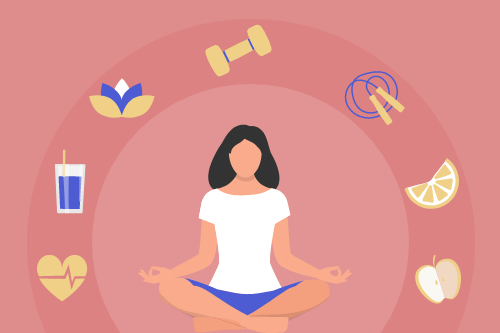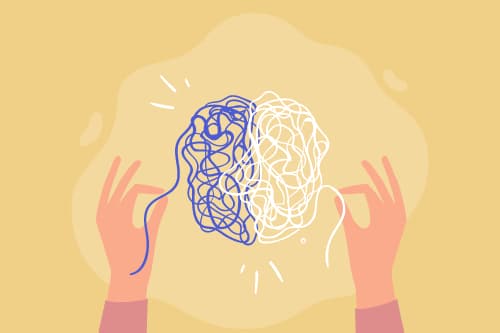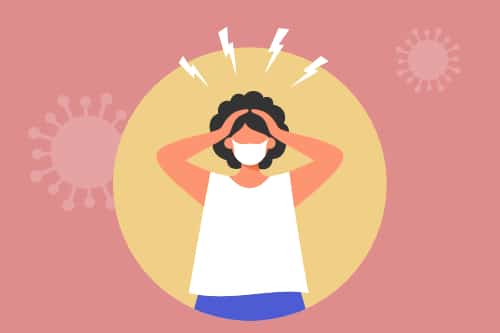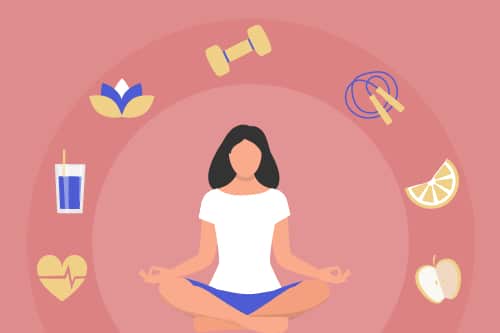
Summary: At this point most have either contracted COVID-19 or have a loved one who has. We have all mastered identifying symptoms and following treatment protocols for COVID-19. However, there is definitely a surge in panic and anxiety attacks that we are experiencing with the onset of COVID-19. In this article we aim at rendering a simple self-help mental toolkit to adopt during your post covid recovery.
Having sleep troubles? We can help… talk to our counselors now!
Introduction
We understand how important it is to be brave through COVID-19. But, at the same time, we also believe that we seldom address the need for a mental health toolkit for a post covid recovery. In this article, we will lay out some of the post covid symptoms to watch out for and to help adopt an organic mental health lifestyle.
How important is Post COVID Mental Health recovery?
COVID-19 is said to have nasty residuals in terms of respiratory tracks, but what takes precedence here is the significant rise in anxiety and depression. Johns Hopkins University conducted a virtual research to understand the mental impact among participants who contracted COVID-19 and results have revealed a staggering increase of 20% in various major mental illnesses. This is definitely something to care for. To understand this better, we need to first look at some of the mental aspects of post COVID recovery.
Signs of post COVID mental distress symptoms
1. Insomnia
Since our biological clock has undergone tremendous changes, the first and foremost symptom of mental distress is INSOMNIA. Erratic sleep patterns/poor sleep quality is a negative influence on the simple decision-making process.
2. Lack of interest
Since it compromises physical stamina to a great extent, it directly correlates with lack of interest in carrying forward simple day-to-day chores.
3. Anxiety
With the development of any symptoms such as cough/sneeze may feel like you have contracted yet another infection. This directly affects your thought process and can be detrimental to the recovery process
4. Low moods
In a recent study by Web MD, patients have reported to have severe mood fluctuations after recovery, lethargy, irrigation & anger to name a few.
5. Stress
60% of adults are said to have reported the highest stress to get back into the productive zone after two weeks of complete isolation.
Here is a simple mental health toolkit for post COVID recovery
#1 Take rest
Two weeks of isolation is bound to get you worked up and wanting to start life in normalcy, however it is important to take it easy and take ample rest in between chores and other tasks. Taking rest allows your mind and body to reconnect and rejuvenate.
#2 Eat a nutritious diet
Take in foods that are rich in fibre and omega3. These have proven to have positive effects in reducing anxiety and depression. Ensure to always check in with your doctor on surfacing any new symptoms.
#3 Exercise a little every day
Do not engage in heavy physical exercises at least until after a month of recovery. Take it easy and workout as much as your body allows you to.
#4 Play a few memory games
Dementia is a common byproduct of COVID-19. Thus, Play memory games like sudoku, mathdoku, crossword, jigsaw, etc. this will also help you while away the time without getting bored and irritated.
#5 Use a thought tracker
This is extremely helpful when you want to keep a tab on your anxious thoughts. The more you write your thoughts down, the better it is for your emotional health. To get started on a thought tracker, you can start by bringing a key focus on three important aspects:
- Number of times you feel anxious?
- At what time do you feel the same?
- How does it make you feel?
#6 Sleep Hygiene
Create a realistic sleep hygiene and try to close all the thinking tabs you have opened right before you fall asleep. It is common to use your phones, tablets, etc. But this can cause erratic sleep schedules. Try to limit your time on social media/news/OTT and create a more relaxing sleep schedule. Do some breathing exercises or read a book, etc.
#7 Socialise with fellow recoveries
Get in touch with people who are in recovery as well. This will help you gain a sense of shared experience and will allow you to ventilate your anxious thoughts as well.
#8 Stop reading
Excessive intake of news about the post recovery phase can really affect your emotional health, thus, keep a tab on your news intake level. Limit your conversations about the sheer open-endedness of the disease among your social circle.
#9 Do things you love
Learning a new skill/attending a discourse/ playing. Gardening, etc… Pick up anything that you are naturally drawn to, this will help you feel a sense of calm and recenter your focus on being positive about the recovery.
#10 Reach out to a professional
If nothing seems to work, then immediately reach out to a professional who can help you with the covid recovery systematically. They can also help diagnose and rule out any underlying psychological cause.
Also read:
How to Grieve the Loss of a Loved one to Covid-19?
How to Stay Sane if You are Quarantining Alone?
Frequently Asked Questions (FAQs)
A. It is very common to experience panic post COVID, it’s important to monitor the frequency of your panic attacks and get immediate professional help if you experience it two times a week. You can also adopt some deep breathing exercises in the meantime.
A. Research has suggested that COVID-19 affects the sleep pattern causing erratic schedules. Try to adopt a simple sleep hygiene routine. If the problem persists for more than a few weeks, check in with your doctor and also speak to a therapist.
A. No country can be prepared for a pandemic with multiple waves. Fear of losing a loved one is the most common side effect, as there is nothing in our control. Sit down with these thoughts at least for five minutes and label them as anxious thoughts. Reach out to our therapist to help you streamline this.





